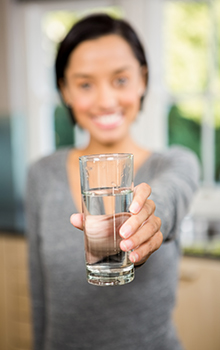Many people reach for cranberry juice when they want to support their urinary tract health, but is it really the best strategy? Loaded with fructose, you could be doing more harm than good. Instead, try this on-going strategy that utilizes not one, but two of cranberry juice’s most exceptional nutrients.
It may come as no surprise, especially if you’re a woman, that you have as much as a one in two chance of dealing with a urinary tract issue during your lifetime.
And men, don’t stop reading… While you may be less likely to experience urinary tract and bladder health issues, you’re not immune, especially once you pass 50. Besides, the women in your life may, at some point, need your support and understanding.

By far, I believe the best approach for optimal urinary tract and bladder health is to make sure you’re giving yourself the right daily care. It’s easy to do.
Taking the proper measures is especially important for certain groups of women, and even men:
- Women who have gone through menopause
- Any man or woman who is sexually active
- Women who are using certain types of birth control, like a diaphragm or spermicide
- Anyone who has trouble emptying their bladder completely
- Anyone with blood sugar or immune health questions
- Anyone with any type of blockage of the urinary tract, such as an enlarged prostate or kidney stone
- Anyone who has had urinary tract issues in the past
As you can see, the list of people who may benefit from paying extra attention to their bladder and urinary tract health is longer than you might expect.
So let’s dive in and discover how to give yourself what I consider the best type of on-going support. But first, to help make sense, I want to show you the simple mechanics of a healthy, normal urinary tract system…
A Quick Primer on Urinary Tract Health: Why Women Especially May Benefit From Daily Self-Care

Below is a diagram of a woman’s urinary tract system. As you can see, there are four major parts:
- Kidneys – Your kidneys filter wastes and water from your blood to form urine
- Ureters – The urine moves through tubes called the ureters to your bladder
- Bladder – Urine is collected and stored in your bladder until it leaves your body
- Urethra – When you’re ready to empty your bladder, the urine leaves your body through a thin tube called the urethra
There are two key differences between the female urinary system and that of a man’s. A woman’s urethra is shorter than a man’s, and its opening is closer to the rectum.
These two anatomical differences explain why women can be more likely to experience less-than-optimal bladder and urinary tract health. Both suggest a greater vulnerability to hostile invaders from either the rectum or urinary opening.
Menopausal women have an additional factor working against them… The normal drop in estrogen levels can adversely affect a woman’s urinary system, especially her urethra.
7 Simple Things You Can Do to Support Your Urinary Tract Heath

There are several things you can do to help support healthy urinary tract function:
- Drink plenty of clear, filtered or spring water every day to dilute your urine and help flush your urinary tract system.
- Urinate when you feel the need – don’t resist or ignore the urge to go.
- For women, wipe from front to back with unscented and unbleached toilet paper, like my 100 percent virgin bamboo pulp Bamboo Bathroom Tissue.
- Take showers instead of baths.
- Cleanse your genital area prior to and after sexual intercourse, ideally with a bidet.
- Avoid feminine deodorant sprays, douches, and powders that can lead to irritation of the urethra and genitals.
- Only use tampons and sanitary napkins that have not been treated with chlorine and harsh chemicals, such as my Organic Cotton Tampons
By following these simple, but effective suggestions, you can help provide your urinary tract system with the on-going care it needs.
In addition, you can support your urinary tract health nutritionally, but not with what you may think…
Why I Don’t Recommend the Go-to Urinary Tract “Hero” – Cranberry Juice!

If you’re a woman, you’ve probably heard that drinking cranberry juice may be good for your urinary tract health.
Some studies do show cranberry juice can have a positive effect on urinary tract health by promoting a healthy flora.* And so does drinking blueberry, peach, and apple juice.
However, relying on this option can come with a big minus for your health…
These juices are all typically loaded with sugar!
Cranberry and other fruit juices contain fructose, a simple sugar that can potentially cause health issues, including stressing your immune health. When you eat sugars and grains (which rapidly break down to sugar), it becomes more difficult to maintain a healthy balance of flora in your gut and urinary tract.
As a result, you’re more likely to experience less-than-optimal urinary tract health.
So, although cranberry juice may offer some benefits, I don’t advise consuming it or other fruit juices because of their sugar content.
However, there is a way you can capture the benefits of cranberry juice without having to consumeall the fructose…
What Cranberries, Blueberries, Peaches, and Apples Have in Common… And Your Urinary Tract Flora Simply Loves It!*

So if studies show that cranberry juice as well as blueberry, peach, and apple juice can positively influence your urinary tract flora, then what is it about these juices that makes them so beneficial?*
So if studies show that cranberry juice as well as blueberry, peach, and apple juice can positively influence your urinary tract flora, then what is it about these juices that makes them so beneficial?*
Although D-mannose is a sugar, it has very unique qualities. Unlike other sugars, it does not convert to glycogen or get stored in your liver.
Your body metabolizes very little of D-mannose so it doesn’t affect your blood sugar levels or stress your body’s metabolic functions.Most of it simply filters through your kidneys and collects in your urine.
And this is key to how D-mannose works to promote urinary tract health…*
When D-mannose reaches your urine, it’s available to meet up with any unwelcome inhabitants that may be lingering in your urinary tract. Upon contact, it “coats” the invaders and carries them away during normal urination.*
D-mannose helps nourish your healthy flora, too. Unlike other sugars, it doesn’t disrupt or affect the actions of your “friendly” bacteria.*
But, beyond the sugar issue, here’s the problem with trying to get D-mannose from cranberry juice… Cranberry and other fruit juices contain some, but not much. The D-mannose found in supplements is 10 to 50 times more potent than that in cranberry juice.
Human research shows that using D-mannose significantly raises blood mannose levels, which is what you need to raise the amount in your urine. And the amount it takes to do that effectively is more than what you may find in juice.
Another Benefit From Cranberries That Few People Know About

More than 70 animal and human studies have been published in peer-reviewed medical journals revealing how cranberries support urinary tract health.*
While many people assume it’s the D-mannose in cranberries that’s influencing their urinary tract health, there’s at least one other factor…
At first, researchers believed cranberry was valuable for bladder and urinary tract health because of its ability to lower urinary tract pH.*
However, then they discovered that cranberry contains naturally occurring compounds that act directly in your urinary tract to promote health.*
One of these compounds is proanthocyanidins (PACs), phytochemicals that provide antioxidant and protective qualities in your mouth, gastrointestinal tract and urinary tract.*
PACs are also found in green tea, grapes, apples, and chocolate. However, the type of PACs found in cranberry – called A-type PACs – are different from the B-type PACs found in these other foods.
And here’s the really important thing you need to know about A-type PACs… Studies show that only cranberry PACs can potentially prevent unfriendly invaders from sticking to your urinary tract walls.
Researchers now agree that this unique quality is cranberry’s claim-to-fame in supporting urinary tract health.* And dose really does matter.
Getting your cranberry in a concentrated extract form (without the sugar), as compared to drinking cranberry juice that is loaded with metabolism-wrecking fructose is truly the way to go!